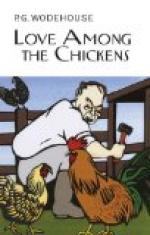“Harrod’s, I think, dear,—yes, it was Harrod’s. It came down with the first lot of things.”
“Then,” said Ukridge, banging the table with his fist, while his glasses flashed triumph, “we’ve got ’em. The Lord has delivered Harrod’s into our hand. Write and answer that letter of theirs to-night, Millie. Sit on them.”
“Yes, dear.”
“Tell ’em that we’d have sent them their confounded eggs long ago, if only their rotten, twopenny-ha’penny incubator had worked with any approach to decency.” He paused. “Or would you be sarcastic, Garny, old horse? No, better put it so that they’ll understand. Say that I consider that the manufacturer of the thing ought to be in Colney Hatch—if he isn’t there already—and that they are scoundrels for palming off a groggy machine of that sort on me.”
“The ceremony of opening the morning’s letters at Harrod’s ought to be full of interest and excitement to-morrow,” I said.
This dashing counter-stroke seemed to relieve Ukridge. His pessimism vanished. He seldom looked on the dark side of things for long at a time. He began now to speak hopefully of the future. He planned out ingenious improvements. Our fowls were to multiply so rapidly and consistently that within a short space of time Dorsetshire would be paved with them. Our eggs were to increase in size till they broke records and got three-line notices in the “Items of Interest” column in the Daily Mail. Briefly, each hen was to become a happy combination of rabbit and ostrich.
“There is certainly a good time coming,” I said. “May it be soon. Meanwhile, what of the local tradesmen?”
Ukridge relapsed once more into gloom.
“They are the worst of the lot. I don’t mind the London people so much. They only write, and a letter or two hurts nobody. But when it comes to butchers and bakers and grocers and fishmongers and fruiterers and what not coming up to one’s house and dunning one in one’s own garden,—well it’s a little hard, what?”
“Oh, then those fellows I found you talking to yesterday were duns? I thought they were farmers, come to hear your views on the rearing of poultry.”
“Which were they? Little chap with black whiskers and long, thin man with beard? That was Dawlish, the grocer, and Curtis, the fishmonger. The others had gone before you came.”
It may be wondered why, before things came to such a crisis, I had not placed my balance at the bank at the disposal of the senior partner for use on behalf of the farm. The fact was that my balance was at the moment small. I have not yet in the course of this narrative gone into my pecuniary position, but I may state here that it was an inconvenient one. It was big with possibilities, but of ready cash there was but a meagre supply. My parents had been poor. But I had a wealthy uncle. Uncles are notoriously careless of the comfort of their nephews. Mine was no exception. He had views. He was a




